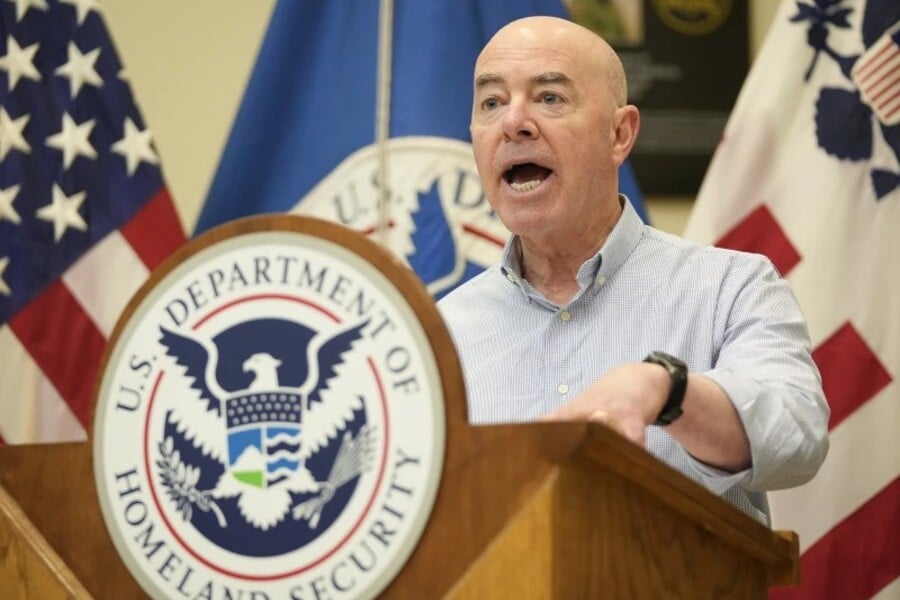
In a landmark decision that could reshape the United States’ approach to immigration and border control, Homeland Security Secretary Alejandro Mayorkas has staunchly defended a policy that allows up to 30,000 migrants from Cuba, Haiti, Nicaragua, and Venezuela (CHNV) to be flown into the U.S. each month. This policy, a cornerstone of the Biden administration’s border management strategy, has survived a lawsuit, marking a significant legal and policy victory.
The initiative, often described as a key element in addressing the complexities of migration and border security, was introduced against the backdrop of an unprecedented surge in migration. Secretary Mayorkas highlighted the policy as not only a response to the humanitarian needs of migrants from CHNV countries but also as a strategic measure to curb illegal border crossings by providing a legal and regulated pathway for migration.
The policy, however, did not come without its controversies. Twenty GOP-led states launched a legal challenge against the initiative, asserting that it was beyond the scope of lawful authority. They argued that the federal government’s parole power, intended for urgent humanitarian reasons or significant public benefit, was being overstretched. The states contended that the policy effectively created a new visa program, allowing hundreds of thousands of migrants to enter the U.S. without the legal basis traditionally required for such entry.
Despite these challenges, U.S. District Judge Drew Tipton, known for his conservative rulings, sided with the Biden administration. The court’s decision underscored the administration’s discretionary power in immigration matters and highlighted the legal standing of the policy under current immigration laws.
Initially launched for Venezuelans in October 2022, the policy was later expanded to include migrants from Haiti, Nicaragua, and Cuba. Eligible migrants, who must not have entered the U.S. illegally, are required to have a sponsor in the U.S. and undergo certain checks before they can fly into the country. This approach aims to provide a structured and humane process for migrants, alleviating the pressure on border control agencies and reducing the risks associated with illegal border crossings.
The program’s expansion was announced alongside the extension of Title 42 expulsions to include these nationalities, a move that further underscores the administration’s comprehensive approach to migration management. By providing work permits and a two-year authorization to live in the U.S., the policy also addresses the economic and social integration of migrants, a crucial aspect of sustainable immigration policies.
Secretary Mayorkas emphasized the significant decrease in the number of migrants from CHNV countries encountered at the southern border as evidence of the program’s effectiveness. By offering a lawful pathway to migration, the policy not only aids those seeking refuge and better opportunities but also helps manage the border more efficiently, ensuring resources are allocated to where they are most needed.
The policy’s success and the legal affirmation of its validity have not gone unnoticed internationally. Other countries grappling with increased irregular migration are looking at the U.S. model as a potential blueprint for their policies. The initiative represents a shift towards more humane and organized migration management practices, setting a precedent for global migration policy.
As the world faces increasing migration challenges, the need for innovative, legal, and humane policies has never been greater. The Biden administration’s approach, as embodied in the CHNV policy, offers a glimpse into the future of migration management. While challenges remain, the policy’s success and legal backing provide a strong foundation for further developments in this critical area.
Through careful planning, legal scrutiny, and a commitment to humanitarian principles, the U.S. is pioneering a path that other nations might follow. The policy not only represents a significant step forward in managing migration in a way that respects the rights and needs of migrants but also reinforces the importance of lawful and orderly processes in addressing the complex issues at the border. In the face of continued debates over immigration, this policy stands as a testament to what can be achieved when compassion and legality intersect in the quest for a more secure and just world.








